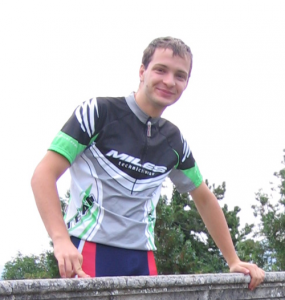Ubuntu is brought to users in their own language by a large community of dedicated volunteer translators, who tirelessly work on localizing every part of the Operating System release after release.
In this series of interviews we’ll get to know who they are, about their language and how they work.
This week we’re introducing you to Andrej Žnidaršič, the Slovenian translation team coordinator.
Andrej Žnidaršič on Ubuntu Slovenian translations
Could you tell us a bit about you and the language you help translate Ubuntu into?
My name is Andrej and I am a 25 year old PhD chemistry student.
I am translating Ubuntu into the Slovenian language (the word Slovene language is also used), which is the native language of Slovenians. Slovenia is a small and hence relatively unknown country in Central Europe, located between Italy, Austria, Hungary and Croatia. Due to similarities in names it’s often confused with Slovakia, a completely different country ;).
All in all it’s a nice place to live. About 2.4 million people speak Slovenian as their native lanugage, which puts us on 178th place, according to Wikipedia.
How and when did you become an Ubuntu translator?
I became an Ubuntu translator in 2007 when I clicked the “translate this application” link. I translated a couple of programs but then I didn’t get any feedback regarding my translations as there wasn’t any team structure established, so in time I became frustrated and more or less lingered around.
But still I wanted to contribute so in summer 2009 I joined the Slovenian gnome translation group. There I met Matej Urbančič (team coordinator) who helped me a lot. At that point I fell in love with translations and translated a ridiciously crazy amount of programs (~ 25 000 strings), learned a lot and polished my sense of vocabulary and grammar.
Nevertheless I still wanted to help translating my favorite distro directly, so when the previous team leader decided to resign I didn’t hesitate for long and became team leader in May 2010. Now I am actively contributing in both teams. So are some other translators. This eases cooperation among teams. I also have Translation Project and Transifex accounts as a means to send translations back upstream.
What other projects do you help with inside the community?
Around 90% of my work is translations-related. Beside translating and reviewing translations I spend time editing the wiki or posting on our blog.
I spend the remaining 10% on the ubuntu.si portal, the Slovenian Ubuntu portal where I am a moderator on the forums and write news pieces about Ubuntu and free software in Slovenian for our users.
I also created a simple wiki page where users can rate how good different providers (for example online banks, photo printing, e-governmet, e-signatures) support Linux. This should help new users to see, whether their provider supports Linux and if not, which provider should they choose. We also hope this will put some pressure on providers to improve their Linux support.
Do you belong to an Ubuntu LoCo team? If so, which one?
I belong to the Slovenian team, which is preparing to submit their application and become an official LoCo.
How can people who want to help with translating Ubuntu and all the various pieces and parts into your language get started?
Simply join our jabber chatroom (we prefer Jabber to IRC) and we will guide you from there. To do that just add a new contact slovenski-prevajalci@partychapp.appspotchat.com to your Jabber or Google Talk account, click on it and start typing. There will be almost certainly someone there to welcome you ;). This shouldn’t be difficult, but if it is, simply mail me to andrej(dot)znidarsic(at)ubuntu(dot)com and I will help you out.
What’s the desktop experience for Ubuntu users in your language? Is Ubuntu in your language popular among native speakers?
We worked really hard in last cycle and managed to push translation level to 99%. That meant an increase of +15% in translation coverage since 10.04, so we are extremely pleased with that. It’s difficult to estimate the number of users, but it seems that younger, especially advanced users, prefer English. The rest mostly uses the Slovenian language.
Where does your team need help?
The more members we have, the more we can translate :). In the 11.04 cycle we plan to focus on Ubuntu (GNOME) documentation, many small programs that are not a part of Ubuntu but are popular among users and Debian package descriptions.
More bughunters would also be nice.
Do you know of any projects or organizations where Ubuntu is used in your language?
I’ve spotted the GNOME panel in a Slovenian Institute for blood transfusion but wasn’t able to determine the language. Otherwise we keep on working to be prepared when migrations occur. For example, I know a primary school is planning to test Ubuntu in the near future. We believe as the quality of Free Software becomes more recognized more of Ubuntu deployments will occur.
What do you feel is the most rewarding part of translating Ubuntu?
I know for a couple of cases where Ubuntu users installed Ubuntu for their (grand)parents. Most of them are not fluent or comfortable with English. So our work allows them to use the software they love. That’s really good to know.
Is there anything else about your team or translation efforts that I haven’t asked you about that you would like to talk about?
I would like to thank each one of our team members and all upstream translators. You guys rock! I would also like to thank my girlfriend, Brigita, who bears with me and my translations obsession, especially last few weeks before language pack freeze.
Become an Ubuntu Translator
Do you speak languages? Join the our translation community and make Ubuntu accessible to everyone in their own language!
Find a translation team for your language: ![]() Help translating in your language:
Help translating in your language:![]()

